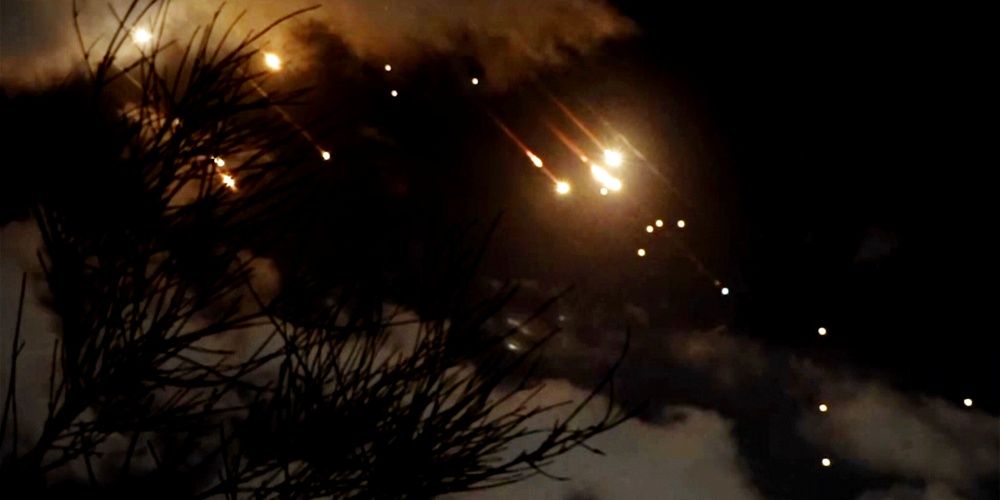(The Economic Collapse Blog)—For as long as any of us have been alive, those that study the Bible have been warning us that there would be an apocalyptic war in the Middle East in the end times. Personally, I have specifically warned about this war in many of my books.
Now a great end times war is playing out in the Middle East right in front of our eyes, but a lot of people out there still don’t seem to get it. This isn’t just another war in the Middle East. What we are witnessing is the final showdown between Israel and Iran.
On Tuesday, Iran shocked the entire world when it fired large numbers of missiles into Israel. The following comes from CNN…
Missiles have been launched from Iran toward Israel and sirens are sounding across the country, according to a statement from Israel’s military.
CNN teams on the ground in multiple locations across Israel have observed dozens of missiles flying above them. Some have been intercepted by Israel’s air defenses, although it is not clear how many.
There are conflicting reports about the exact number of missiles that were fired at Israel.
But everyone seems to agree that “hundreds” of missiles were in the air, and videos posted on social media appear to show many of them making impact.
Iran is claiming that 80 percent of their missiles made it through, and the IDF is admitting that at least some of the missiles were not intercepted…
Iran’s state TV claimed that 80 percent of their missiles launched at Israel hit their target. It’s unclear exactly what the targets were.
Israeli army spokesman Rear Adm. Daniel Hagari said the country’s air defense system was fully operational, detecting and intercepting threats.
‘However, the defense is not hermetic,’ he noted.
Just prior to Iran’s attack, the White House warned that there would be “severe consequences” if Iran launched missiles at Israel…
White House and Defense Department had warned earlier that Iran was preparing to launch ballistic missiles at Israel.
“We are actively supporting defensive preparations to defend Israel against this attack. A direct military attack from Iran against Israel will carry severe consequences for Iran,” a senior White House official told NBC News.
So what will those “severe consequences” look like?
Is the Biden administration about to fire missiles at Iran?
The Israelis are also promising to respond “in the place and the time we determine”, but we don’t know any specifics at this stage.
If the Israelis strike back at Iran, and I am entirely convinced that they will, the Iranians are warning that they will launch a “crushing attack”…
“Should the Zionist regime respond to Iran’s operation, it will face crushing attack,” said the IRGC, Iran’s paramilitary organization.
This is not going to end well, but most of you already knew that.
Just before Iranian missiles were launched on Tuesday, there was a horrifying terror attack in Jaffa that resulted in the deaths of eight people…
Eight people were killed and at least seven wounded, as well as a dog, in a shooting terror attack in Jaffa, in central Israel, on Tuesday evening, Magen David Adom reported.
At least four people were reported critically wounded. Magen David Adom announced that the incident involved multiple causalities.
The shooting occurred near a light rail station in the central Israeli city. Two terrorists who were observed exiting the train were shot dead by security forces.
We should expect to see a lot more terror attacks in the days ahead.
Now that IDF forces have entered southern Lebanon, there is no turning back. Israeli Rear Admiral Daniel Hagari is characterizing the incursions into southern Lebanon as “localized raids”, but everyone realizes that this is just the beginning.
So far, it is unclear how much success Israeli troops are having in southern Lebanon.
There were reports that Israeli forces successfully entered a number of villages in southern Lebanon, but Al Jazeera insists that the IDF is encountering “fierce resistance” from Hezbollah militants…
Ali Rizk, a security and political affairs analyst based in Beirut, says Israeli troops attempted to “overwhelm” Hezbollah fighters in southern Lebanon late last night but were repelled and forced to withdraw.
“What the Israeli side might be doing is a propaganda war when they speak about successfully entering Lebanese territory. So this might be part of an Israeli psychological war, which wouldn’t be the first time they resort to such tactics,” Rizk told Al Jazeera.
“We’ll have to see how the ground invasion unfolds. But – according to a source with ties to Hezbollah – the Israelis did meet fierce resistance in the late hours of last night. It does appear this is not going to be an easy battle for Israel, even if Hezbollah has lost its leader and senior military commanders. That still leaves Hezbollah to be a formidable foe to inflict heavy costs on the Israelis in their ground invasion.”
Right now we are in the early hours of fighting, and so we may not get a fully accurate picture of what is transpiring on the ground for a while.
But without a doubt this is going to be far different from what we witnessed in Gaza.
Hezbollah is far more powerful than Hamas was, and Hezbollah has much more powerful allies.
Following the overnight raids into southern Lebanon, Israeli officials “called on residents in more than 20 areas in southern Lebanon to evacuate their homes”…
Following the overnight raids, IDF officials this morning called on residents in more than 20 areas in southern Lebanon to evacuate their homes, signalling more ground operations were imminent.
‘The IDF (Israeli military) does not want to harm you, and for your own safety you must evacuate your homes immediately.
‘Anyone who is near Hezbollah members, installations and combat equipment is putting his life in danger,’ army spokesman Avichay Adraee said on X.
This seems to indicate that Israeli forces will soon be attempting to move into those areas.
Of course Hezbollah sees this as an “invasion”, and Hezbollah officials have warned over and over again that an “invasion” of southern Lebanon will mean all-out war.
And now that hundreds of missiles have been fired into Israel, it appears that the Iranians and the Israelis are on the verge of all-out war too.
We have been warned that this was coming for decades, and now it is here.
A great end times war in the Middle East has begun, and it isn’t going to be pretty.
Michael’s new book entitled “Why” is available in paperback and for the Kindle on Amazon.com, and you can subscribe to his Substack newsletter at michaeltsnyder.substack.com.
- Gold SKYROCKETED during Trump’s first term and is poised to do it again. Find out how Genesis Precious Metals can help you secure your retirement with a proper self-directed IRA backed by physical precious metals.




